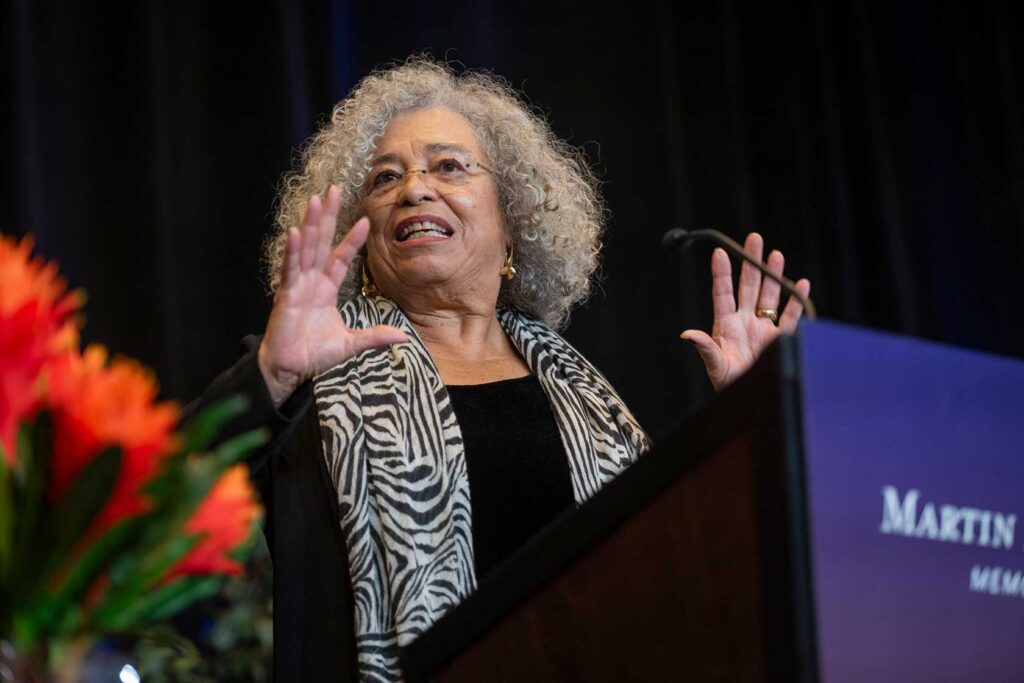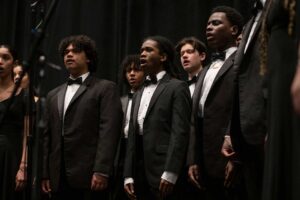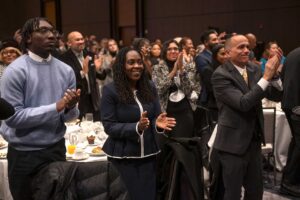
While most of the world was still reeling from the death of Martin Luther King Jr., two close friends and Boston-based pastors created a way to honor his legacy and that event still endures today.
In 1970, the pastors of Boston’s St. Cyprian’s Episcopal Church and Union United Methodist Church came together to create the Martin Luther King Jr. Memorial Breakfast. This year, the annual tradition celebrates its 55th year.
Rudelle Fenty is the treasurer for the host committee for this year’s breakfast. She has been a part of the host committee for over 20 years and loves her small part in keeping MLK’s legacy alive.
“It’s a joy to come and commemorate Dr. King’s birthday so that we don’t forget because younger people these days think things just happen to keep his memory alive. I will continue for as long as the church, you know, wants me to do it, and the committee as well,” she said.
Fenty said the breakfast has gone from a few people gathered in King’s name to almost 1500 attendees this year.
“It was held in the basement of St. Cyprian’s Church for a number of years, until the attendance grew. With the assistance of former Mayor Menino, because the Boston Convention Center was going to be open then, he suggested, ‘Why don’t we try having it there?’ And we went ahead with that, and we’ve had it there for number of years at the convention center. This year was at the Omni Hotel just across the street at 450 Summer Street,” she shared.
A highlight of this year’s breakfast was the keynote speaker, Angela Davis, known for her work in the Black Liberation and feminist movements.
Fenty said the organization had their sights set on Davis for a while but this year the stars aligned and they were able to get her.
“We wanted her for 2024 and she wasn’t available at that time. And this year, we went back to our agency to see if we could get for 2025 and thankfully, it worked out,” the treasurer said.
Davis opened up her speech by thanking those involved in the breakfast for the invitation which she was happy to accept due to the holiday’s serendipitous timing with the presidential inauguration of Donald Trump.
“Thank you so much for inviting me. I did not know at the time that I would need to experience a meaningful alternative to the events of January 20,” the orator said half jokingly.
It was a bit of a homecoming for the California resident who spent some time in the New England area while she was a student at Brandeis University.
Keeping in line with the event’s theme “Freedom isn’t free,” Davis shared what she and others had to go through for the acknowledgment of King’s birthday as a national holiday.
“Let me say that many years ago, I was involved in the campaign to declare Dr King’s birthday a national holiday. Let us not forget that this celebration was not given to us. We fought for it,” Davis said.
Like the hundreds gathered in the Omni Hotel’s ballroom on Monday morning, the activist shared that the King holiday is more than just a birthday celebration. She said it’s a call to action.
“There are traditions that we mark simply because they are traditional, assuming that their meaning resides primarily in the past. But in the case of Dr King’s birthday, it seems that each year we witness ever more compelling evidence why we should not only celebrate Dr Martin Luther King, Jr and the radical freedom movement for which he served as a spokesperson but also why we need to renew our commitments to struggles against racism, militarism and capitalism,” she said.

A choir performs at the Martin Luther King Jr. Memorial Breakfast. PHOTO: JEREMIAH ROBINSON/MAYOR’S OFFICE
Martin Luther King Jr. Memorial Breakfast Co-chair James Dilday suggested this year’s theme, “Freedom isn’t free” to remind people of King’s legacy and that there is still work left to do.
“It’s important for us to understand that nothing is given to us. If we want to be free to worship, if we want to be free to walk down the street without being harassed by the police, we have to go out and fight for these things. Nobody’s going to help us but ourselves,” he said.
He went on to say that it was King’s non-violent approach that made him such a unique historical figure, even though Dilday didn’t understand it himself as a young civil rights activist in the 60s.
“One of the major things he was able to do was to galvanize, organize and articulate some of the things that we had not been able to articulate on our own. Being a nonviolent person, not fighting the people who were beating us down, made him a stronger person. It made the movement a stronger movement,” he said.
Davis said King’s legacy is less about the man and more about what he stood for.
“I’m asking you to think about the relationship between the present and the past, because I am persuaded that as we celebrate Dr King and his legacy, we imagine him as forward-thinking. And when I say him, I’m not talking about the single individual, because for us, Dr King stands for a whole movement. Let’s learn how to recognize that Dr King is a kind of meta name for vast numbers of people, especially women, who are responsible for the successes of this movement,” she said.
Before closing out the program, Davis offered the crowd a few words of encouragement.
“What we are experiencing now will not last. We’re up against racist and recklessly destructive enemies, but we are many, and if we do our work and hold our ground, we will grow and our numbers will become even larger. And secondly, know that we are strong and on the right side of history,” she concluded.







